Banquets in Washington DC and Changsha
Chinese President Hu Jintao was honoured with a state banquet at the White House last night. Apparently he and his entourage had requested a ‘quintessentially American’ menu, and this is what they were given:
D’Anjou pear salad with farmstead goat cheese, fennel, black walnuts and white balsamic
Poached Maine lobster with orange-glazed carrots and black trumpet mushrooms
Lemon sorbet
Dry-aged rib eye with buttermilk crisp onions, double stuffed potatoes and creamed spinach
Old-fashioned apple pie with vanilla ice cream.
It would be fascinating to hear what President Hu actually made of the dinner. He grew up in Jiangsu, in the refined, rice-eating south of China, and has also lived in Gansu, Guizhou, Tibet and Beijing, though not, I think, abroad. I assume he’s had plenty of experience of foreign food on his international trips, and perhaps occasionally in Beijing, so perhaps he has cosmopolitan tastes. Many Chinese people, however, especially those of his generation, would be less than delighted with raw salad and goat’s cheese, and with the prospect of eating a whole slab of beef, even if the meat was well done (rare, pink-oozing meat is an atrocity in terms of Chinese gastronomy). The main complaint of Chinese gourmets when it comes to ‘Western food’, though, is that it’s simple and lacking in variety, as I’ve mentioned before. And, reading reports of the banquet, I couldn’t help remembering an article in the Guardian newspaper of former President Jiang Zemin’s visit to London in 1999, which mentioned that the personal belongings that had accompanied him to Buckingham Palace had included ‘boxes of Chinese food’. I had a sneaking suspicion that the poor man, subjected to days of unfamiliar food at unsufferable banquets, was expecting to have to resort to snacks of instant noodles every night before bed.
By means of contrast, the menu on the right is from a provincial government banquet in Hunan that I attended in November, at the West Lake Pavilion restaurant in Changsha, the ‘biggest Chinese restaurant in the world’ (it can seat as many as 5000 in its various halls. I first wrote about this place in the Financial Times several years ago, and it was later the subject of a 3-part TV documentary). As you can see, the menu lists 24 dishes, if you include pickles and the final fruit platter: slivered bamboo shoots with preserved mustard greens, pickled sweet potato, radish skin, rustic mixed vegetables, peanuts in old wine, crisp ears with coriander, cold cooked beef, snake with chilli and ginger, secret-recipe turtle-meat, pig’s feet with pig’s stomach, West Lake head steamed in a bowl (can’t remember what this was!), large prawns with green chillies, ‘floating fragrance’
aromatic duck, steamed Western Hunan smoked meats, mountain goat stewed with mung bean sheets, Hunan-style Dongpo pork, secret-recipe bighead carp, claypot Chinese yam, stir-fried smoked donkey, Liuyang mountain bamboo shoots in chicken stock, Liuyang yellow vegetable, blanched seasonal greens, West Lake steamed buns stuffed with meat, platter of cut fruit. The ingredients and the cooking methods are many and varied, and the menu showcases a number of famous local ingredients. It does, however, avoid the more extravagant Chinese delicacies, such as shark’s fin and sea cucumber, which might be seen as inappropriate at a feast held at public expense.
The ironic thing about grand Chinese banquets, though, is that it’s almost impossible to appreciate the food, as you might guess from my very sketchy account of the menu. Banquets in China are about so many things besides food, including, depending on the occasions, social relationships, business, face; hierarchy, sycophancy, bribery, festivity… Like President Hu’s state dinner at the White House, the Hunanese banquet was a formal occasion, and the guests had very little time actually to eat. The festivities commenced promptly as 6.30pm, and finished promptly at 8pm. In between, as the dishes came
thick and fast from the kitchens, there were speeches, acrobatic performances, songs and dances performed on the grand stage at the front of the hall. For much of the time, the guests milled around the tables, toasting each other as individuals and in groups, with tiny cupfuls of bai jiu (strong grain spirits), red wine or (for the teetotallers) orangeade. The general manager of the restaurant, Qin Zhong, who was so kind to me when I lived in Changsha, took to the stage for a stunning operatic duet with a chef from Beijing (she used to be a professional singer). A Hunanese celebrity chef who lives in Japan gave a brilliant performance of a karaoke song on stage. I was press-ganged into making a very brief speech, but absolutely refused to sing a song! Meanwhile, about five hundred guests milled around, toasting, exchanging pleasantries, smoking cigarettes,
and trying to snatch mouthfuls of food from time to time.
For me, the funniest moment of the whole evening, and probably my entire trip, occurred during a conversation with the government official who was sitting next to me at that dinner. He had seen my photograph on the front page of the local Party Daily, Hunan Ribao, which had featured the food conference which we were all attending. ‘Ms Fu,’ he said, ‘I hope you realise that even senior leaders struggle to get their pictures on the front page of Hunan Ribao’. One thing I never thought I’d be was a cover girl for a communist newspaper.
As usual on such occasions, I left entertained but still hungry, and needed a midnight feast before I could sleep. I was reminded, as ever, of the Qing Dynasty gourmet and food writer Yuan Mei, who went home after a 40-course banquet and needed a bowlful of congee to fill his belly.

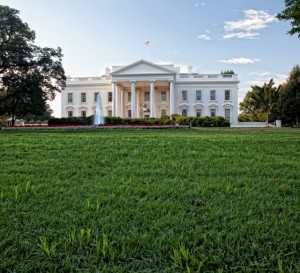
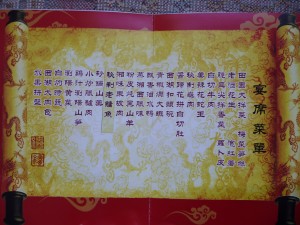
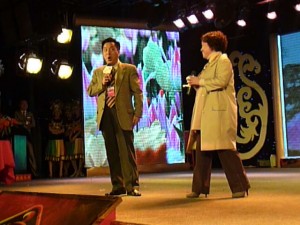
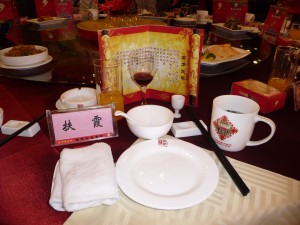
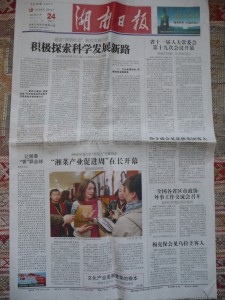
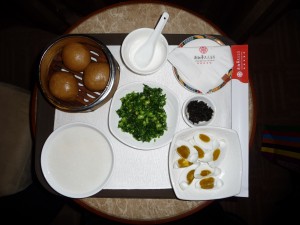
13 Responses to “Banquets in Washington DC and Changsha”
I believe the mysterious character is the traditional, and somewhat stylized form of Gui, or turtle.
Aha! Thanks Bill. Will check and amend.
I have to say, as someone who has lived in China for many years (though no longer does so) and who has also spent considerable time with Chinese travelers outside of China, that I was very pleased that the White House offered a challenging menu at this State Dinner. It is inconceivable that the Chinese would serve American food at the Great Hall of the People to a visiting US president, and I see no reason why the US should offer a Chinese menu. The Chinese are not above knowingly foisting “challenging” dishes to visiting foreigners, perhaps in an effort to suss out whether they are truly “friends of China”, so I’m all for the White House and Buckingham Palace doing the same! Wonder what Hu would make of toad in the hole or spotted dick.
In Toronto I saw a documentary at HotDocs, a documentary film festival, on The Biggest Chinese Restaurant in the World. I’m pretty sure it must be the one you mention, but the Youtube link is “blocked in [my] country on copyright grounds.” It was a fascinating, particulary the restaurant owner herself who embodied all these contradictions. There’s a scene where she has her chefs compete deep-frying live fish. Later she is releasing turtles into a stream to perform a good deed – but the turtles crawl back out of the polluted stream. Telling and sad.
I’m off to Changsha in 30 days. I don’t think I’ll be sampling the live fish. Hopefully I can hold up to the Hunan heat.
A couple thoughts on the White House banquet — the menus for these formal affairs are shared between the diplomatic parties well in advance so if there were objections to goat cheese or the like, the Chinese delegation could have raised them. You can be certain that menu met with the approval of Hu Jintao.
The menu was actually a decent representation of American cuisine, at least most of them are American grown products. I’d have probably suggested something like barbecue, Brunswick stew, corn bread… But that’s a bit too common for a state banquet.
Hi James
Yes, good point. Actually I wasn’t intending to suggest that the meal would cause shock and affront, a diplomatic incident! I’m just interested in how different the standards of appreciation are in different cultures. A Western diplomat or dignitary, for example, might be perfectly willing to eat sea cucumber at a Chinese state banquet, but I’d be surprised if anyone who hadn’t had years of experience of eating such things would actually enjoy it!
The White House says the delgation asked for a taste of America. At least they didn’t get taken to Ben’s Chilli bowl, where Sarkozy gorged on a half smoke.
James G
I don’t think President Hu would have batted an eyelid if he saw ‘toad in the hole’ or ‘spotted dick’ on a menu, as long as he believed them to be literal descriptions. He might be less pleased if he realised they were actually a slightly greasy sausage in batter and a stodgy steamed pudding.
Only joking. (or half-joking)
It’s actually a really boring, staid, bourgeois menu. Like one you might find at a chain restaurant trying to impress, or a bad hotel. There are so many great American ingredients that could have been featured. What were they thinking? I’d have held out for midnight congee too.
As a doctor of Oriental medicine, I blog about Oriental medicine’s principles and its importance in 21st century health care. As you know, food is an integral part of the medicine’s brilliance.
I posted an article about ice cream at the same time that Hu Jintao was being fêted at the White House — and the irony of serving the Chinese president ice cream. http://bit.ly/gXCwbl
I’m delighted to find your blog, Fuchsia, and look forward to reading what you share. Keep up the good work!
I guess the ”West Lake Pavilion” restaurant is not the famous Lou Wai Lou restaurant I had the pleasure of being feted at in 1984.
I still have the beautiful hand written menu.
Chinese business colleagues in Shenzhen have boasted to me that the biggest Chinese restaurant in China is in the Kempinski Hotel in the NanShan area of Shenzhen.
They have taken me there and its huge but the food is not very good.
Its about time the Guinness people went to China and settled this question !
Re the menu in Washington
Its not something I would have served visting Chinese of Hu’s age, however we are talking about very well travelled Chinese politicians here and perhaps Hu chose the menu to give his less well travelled colleagues a bit of a shock.
I find younger Chinese in China now love to eat Steaks, Sushi, Cheese,McDonalds fast food etc, some of the things that would have made kids the same age vomit just 20 years ago.
Hi Fushsia Dunlop
By the way, woujld you please tell me how Hunanese restaurants in the US smoke pork? I have 2 beer bars in Oakland and one has a smoker. Is the pork leg or butt cured first and then hot-smoked? Do they use the tea-rice-sugar method of smoking? I know that in Hunan itself the hams are dry cured and cold-smoked.
Thanks very much. Hope you can help.